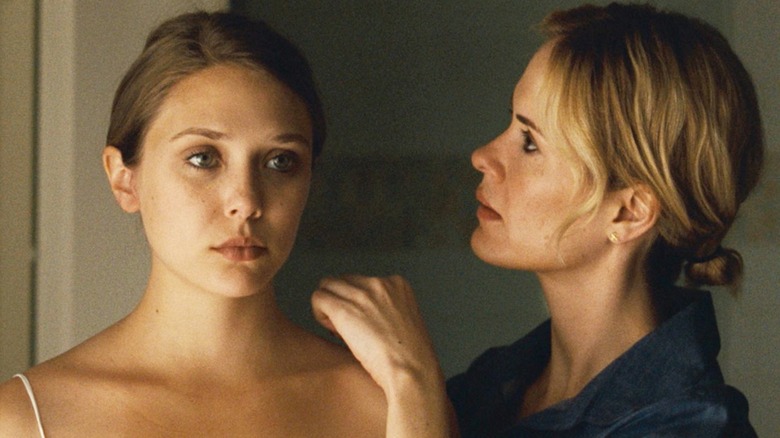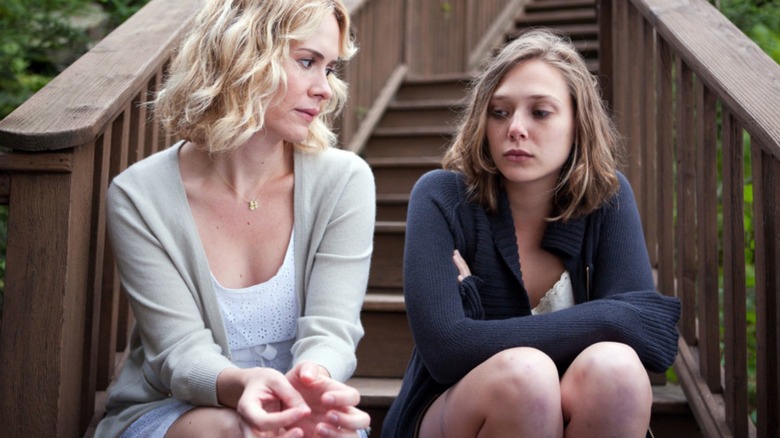The Overlooked Drama That Landed Elizabeth Olsen Her Breakthrough Marvel Role
We may receive a commission on purchases made from links.
It isn't controversial to state that Elizabeth Olsen is breathtaking as Wanda Maximoff. The Marvel Cinematic Universe (MCU) has crafted a meaty arc for this complex character, whose moral compass breaks down once grief consumes her. Both "WandaVision" and "Doctor Strange in the Multiverse of Madness" are emblematic of this, as these stories capture Wanda's deep-seated sense of loss and her twisted desire to remake the world as she pleases. The more recent "Marvel Zombies" veers Wanda toward complete moral bankruptcy, as she goes to great lengths to plunge the world into chaos. Olsen portrays these distinct emotions with incredible depth, as Wanda never comes off as a flat antagonist — even in her darkest moments, we see her vulnerability simmer just beneath the surface.
Tara Bennett and Paul Terry's "The Story of Marvel Studios: The Making of the Marvel Cinematic Universe" details how Marvel Studios executives met with Olsen in 2011 after they were impressed with her performance in "Martha Marcy May Marlene." The meeting wasn't for a specific role at the time, and the studio simply wanted to let Olsen know that they would keep her in mind for future projects. This preemptive interest in Olsen's acting caliber makes sense, as she delivers an astonishing performance in Sean Durkin's overlooked psychological thriller, which also happens to be her theatrical debut.
Olsen plays Martha in "Martha Marcy May Marlene," which paints a disquieting picture of cult brainwashing and its horrific aftereffects. Martha goes by many names — the cult patriarch calls her Marcy May, and she, along with all the other women, uses the name Marlene to answer the common telephone. Even after escaping the cult, Martha struggles to ease back into a life of her own, which is exactly where the terror of this story lies.
Martha Marcy May Marlene is an ambitious and impressive debut for Olsen
Spoilers for "Martha Marcy May Marlene" ahead.
The affluent Lucy (Sarah Paulson) and Ted (Hugh Dancy) are on vacation in their posh lakeside home, but the former suddenly gets a call from her sister, Martha, who asks Lucy to come get her. Once she moves in with the couple, the signs of abuse are apparent, which are fleshed out through flashbacks featuring the menacing cult leader, Patrick (John Hawkes). Patrick employs unsettling methods to assert ownership over his commune, especially the women, who are forced into identities that he carves for them. Martha is understandably traumatized, and she's unable to shed the learned behaviors that the cult ingrained into her, including basic social propriety and personal boundaries. A sliver of unease persists, as we're forced to wonder how she was able to escape, and whether the cult will come after her.
The unsavory nature of these flashbacks is hard to stomach at times, but Durkin relies heavily on implication to create a tense, discomfiting atmosphere that lingers even after the credits roll. Both Olsen and Hawkes deliver standout performances, where Martha's troubled vulnerability clashes repeatedly with Patrick's calculated manipulation. Nothing feels contrived here, as these characters unravel in the most convincing ways — Patrick hides his chillingly abusive nature through manufactured warmth, while Martha oscillates between naivety and an evolving self-awareness.
Jody Lee Lipes' cinematography deserves appreciation here, as the film's non-linear structure comes alive to gradually construct Martha's crumbling, disorienting world. Unfortunately, Ted and Lucy's lakeside home isn't much of a safe haven for Martha either, which adds a paranoid edge to everything that happens in the present and beyond.
"Martha Marcy May Marlene" is available to stream on Apple TV.

